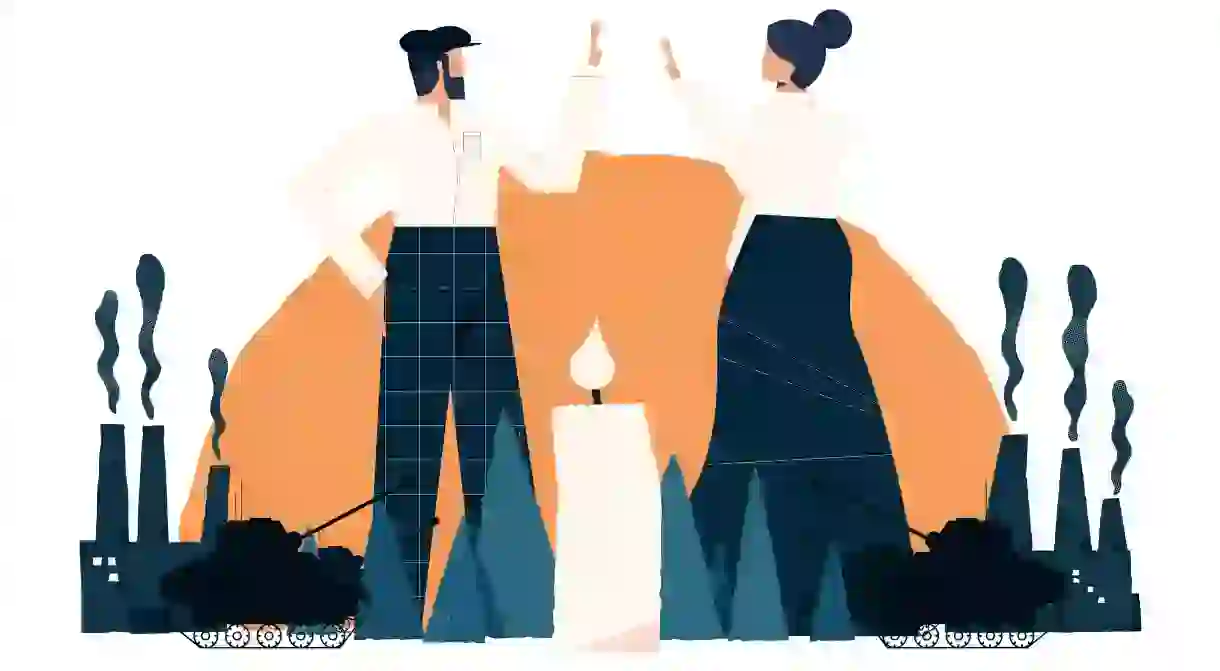'Shortening the Candle's Wick', a Poetic Dialogue on Estonia's Painful Past

The first in our three-part series on Baltic literature, Andres Ehin and Ly Seppel’s joint collection deals with the trauma of Estonia’s past under Soviet rule.
Shortening The Candle’s Wick takes the form of a poetic dialogue between Estonian husband-and-wife duo Andres Ehin and Ly Seppel, but it feels more like a merging of two souls. Flickering between Ehin’s surrealist imagery and Seppel’s intimate lyricism, their voices exist in solitude; private spaces of thought and reflection, but ones which echo and respond to one another in a graceful counterpoint. As if burning the wick from both ends, their words dance towards each other, before the flame is extinguished, and there is only memory, release and perhaps, finally, freedom from a traumatic past.
In 1918, Estonia – along with Latvia and Lithuania – declared independence from Russia. Their independence was more nominal than fundamental, as, before long, the Baltic states found themselves under Russian rule, this time annexed by the Soviet Union in 1940, a move that was not recognised by many Western states. Since the dissolution of the Soviet Union, independence has been restored but the scars continue to seep. It is these scars – psychological, geological, national – that Ehin and Seppel’s poems look to inhabit, treat and heal, while the work as a whole is a monument to their own intimate love story.

The opening line of the work – ‘Framed by stone walls’ – immediately addresses leftovers of oppression and limitation. This line feels distinctly personal and political, as if Seppel is considering how to take up space both as a poet within her poetry and as a citizen within an oppressive state. Seppel’s poems are often in conversation with space: ‘between the timbers’, ‘beside the warm oven’, ‘To drink sour Kvass in the shed / then go up to the loft.’ To find pockets of privacy is to survive politically, and to flourish creatively.
If the trauma of the Soviet occupation can be felt in the mind, it can also be seen in the landscape. The earth in these poems consists of clusters of ‘dead grass and a layer of decay’ and of ‘dreary parched land’ while the sky is ‘stretched / tight as a drum / that could burst into shreds / with every beat.’ It is not only humans that carry the scars of the past, but nature too. Nature is both a container for memories, and its trigger, as ‘Birch branches rustling / against the attic window / bring mother to mind.’ Though bluebells appear in a ‘patch of sunlight’, they are ‘bowed’, perhaps still obeying a power that’s no longer there. Sometimes history can weigh heavier than gravity.

Sorrow and melancholia are reinforced with nostalgic recollections of childhood, of a lost innocence. In one poem, Seppel remembers the popular Estonian children’s song-game ‘Geese and Swans’ in which one player who is the wolf must catch the others, the geese and swans. As Seppel calls for the geese and swans to ‘come back home’, we sense the fear of the wolf – of a menacing, murderous power – is still too strong. The result is powerful as our thoughts pan to the flocks of Estonian children who were forced to migrate, orphaned from their homeland.
Against a backdrop of political and social fragmentation, Seppel and Ehin’s poetic unity is poignant. Images and motifs are subtly echoed as we leaf through the work, alternating between the two voices: Seppel’s description of sorrow as a ‘skinny desert dog’ partners Ehin’s ‘long-limbed sorrow’ of the city streets; as Ehin describes the wild, untamed ‘black horse’ of night, Seppel answers this with an image of a wind that ‘gallops’. Ilmar Lehtpere’s translation has sensitively captured these subtle, linguistic echoes, through which the husband and wife’s common vocabulary can take shape.
Towards the end of the work, we feel as though the poets are addressing each other more directly. As Seppel writes, ‘I run like a hound following your fading tracks,’ she foreshadows her husband’s death (Andres Ehin died in December 2011), and the inevitable extinguishing of the candle’s wick. The final poem – the titular poem – ends with a moving climax:
‘Don’t be daunted, believe / in your own understanding, / even if there is no hope / of ever meeting again. Shortening the candle’s wick / I am only now learning / in the language of the sleep faerie, / how in a spirit of joyful gratitude / I can let you go.’
Her words are achingly beautiful, unbearably sad, but in letting go, Seppel suggests there is release and perhaps a way to be finally free of a traumatic past. Being free of the past also means free of each other, which casts the dying embers of the work in a bittersweet, sombre hue. Rainer Maria Rilke described love as consisting of ‘two solitudes which border, protect, and greet each other.’ Shortening The Candle’s Wick transforms Rilke’s aphorism from a romantic idea to a written reality.
This review is part of our Baltic Centenary series, a three-part review series of books from Estonia, Latvia and Lithuania celebrating 100 years of Baltic independence. Shortening The Candle’s Wick by Andres Ehin and Ly Seppel is published by Little Island Press, £12.99.













